So you think you might have vestibular migraine - what do you do? Who are the best doctors? How do you get on the path that feels steady again? This is the vestibular migraine guide for you!
Many of us didn’t know what the heck was happening to us when we began to experience many symptoms like vertigo, imbalance, derealization, and brain fog…and neither did our primary care doctors.
If you’ve read my story, you’ll know I started out with a primary care doctor who told me I was stressed. Then an ENT doctor who thought it was a neuritis and would go away. Then to several neurologists who said I just had anxiety. There was that vestibular rehab clinic that told me I probably had a perilymph fistula too.
As we bounce around from doctor to doctor, never getting answers, the problem begins to feel insurmountable. I put together this little guide that can help you know where to start and what the process might look like.
Jump to:
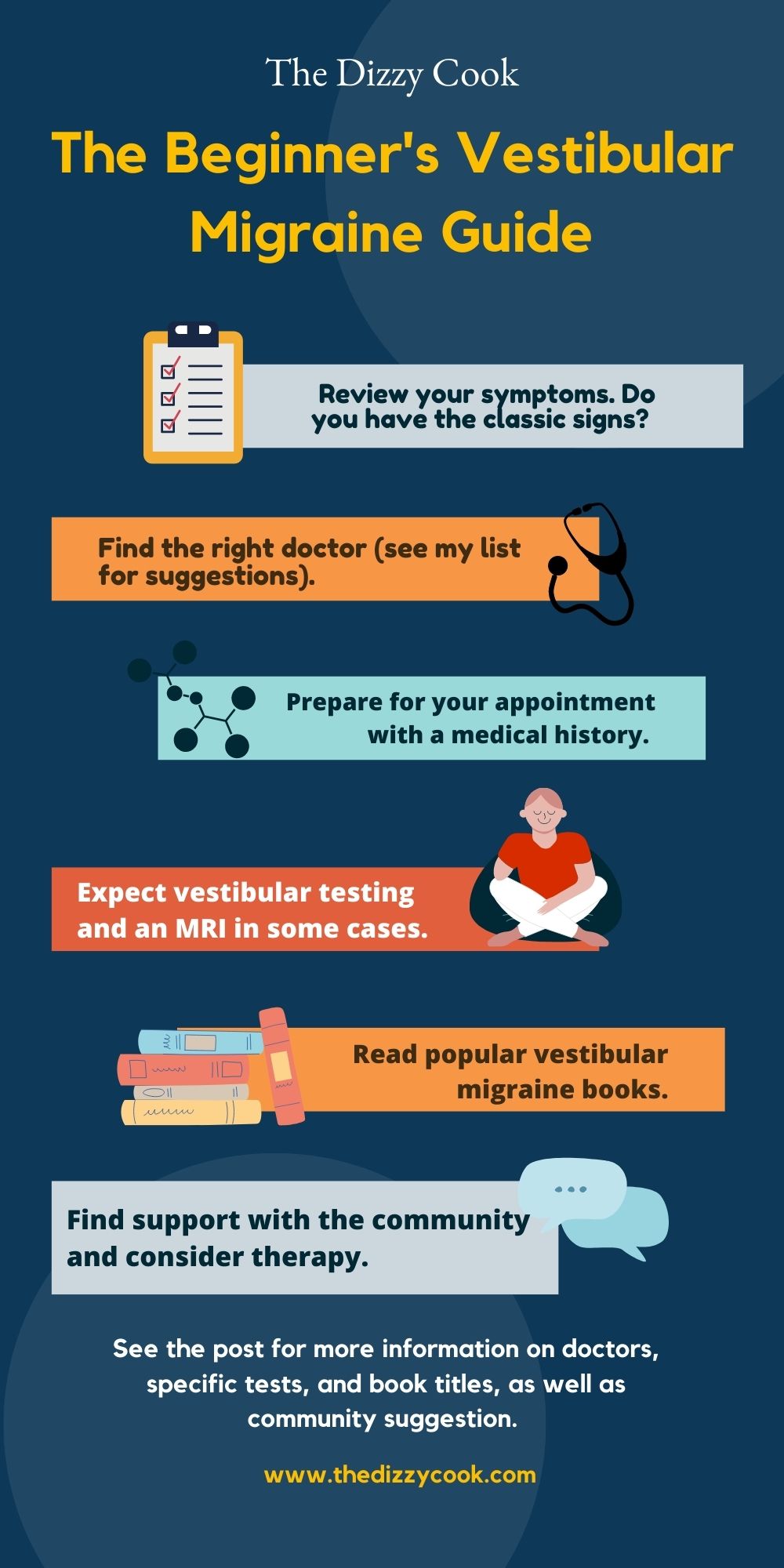
1. Review The Symptoms
First of all, read this post about common vestibular migraine symptoms.
Do any of these symptoms match yours? If so, it could be vestibular migraine or another vestibular disorder. Since vestibular disorders can mimic each other it’s important to be properly diagnosed by a physician familiar with these disorders and not by Dr. Google or Random Person In Your Support Group.
2. Find The Right Doctor
Find a doctor that knows what they are doing & be prepared to wait.
If you want to start with your primary care doctor - go for it! But in my experience, I wish I would have fast forward to the doctor I really needed to see, saving myself a lot of money. The only catch is you may need a referral to one of these doctors from a primary care doctor.
Also keep in mind that not all neurologists or ENT’s know how to treat vestibular migraine. Since it’s a fairly new diagnosis, some have not even heard of it before. The most reliable choice is a neuroTologist - who specializes in the inner ear. However, doing a little research and calling around can get you far.
Most doctors will mention what they treat on their website, but if they don’t call and check with their office to see if this is something the doctor is familiar with. Keep in mind that there are less than 10 doctors who are considered experts in this area and their wait lists prove it.
My neurologist, Dr. Beh, had a 7 month wait list, but I was persistent, always calling for cancellations. Put your name on the list while you search for other options and be willing to travel for the best care. Now many of these physicians will do teleconference, so please double check with their office if you cannot travel.
Vestibular Migraine Doctors
The following are doctors who treat Vestibular Migraine that I have seen personally or have come highly recommended by patients. Please note, everyone's experience may be different, but these people have overall positive reviews.
- Dr. Edward Cho - Formerly House Clinic, now Cedars Sinai Medical Center
Phone: (310) 423-1220 - Dr. Kristen Steenerson at Stanford, CA.
- UCLA Migraine Clinic
- Dr. Dean Le in Laguna Hills, CA
- Eva Larson PA in Orange County, CA
- Dr. Helen Xu, Loma Linda, CA
- Dr. Nina Riggins at UCSD
- Dr. Shin Beh at Beh Center for Vestibular and Migraine Disorders in Dallas, TX and online - Full disclosure, this is my personal neurologist that I have seen for 7 years. He sometimes cannot accept new patients due to demand, but has a wait list. He also does not accept insurance. Yes, it's worth it.
- Dr. Laura Bonds Woodlands, TX
- Jaclyn Duvall, Tulsa, OK
- Dr. Timothy Hain - Formerly Chicago Dizziness and Hearing is an expert who has done great research in the field. He's back to practicing at UChicago which is very exciting!
- Dr. Adrian Priesol at Mass Eye and Ear in Boston
- Dr. Acharya at SLUCare St. Louis
- Dr. Habib Rizk at South Carolina
- Dr. Kenneth Watford at Vanderbilt, SC
- Dr. Christopher Danner - Tampa Bay Hearing
- Dr. Rhanni Herzfeld in Washington DC
- Dr. Lauren Natbony NYC
- Dr. Jann NYC
- Dr. Joseph Safdieh NYC
- Dr. Noah Rosen NYC
- Dr. James Kirkland Roberts
- Dr. Vanessa Cooper at Yale in New Haven, CT
- Dr. Michael Teixido, ENT & Allergy of Delaware I've had some mixed feedback recently from patients, but overall positive!
- Dr. Claire Ceriani at Jefferson Headache Center in Philadelphia, PA
- Dr. Deena Kuruvilla at Westport Headache Institute
- Dr. Courtney White, Jefferson, PA
- Dr. Bryan Ward and Dr. John Carey Johns Hopkins (SCDS and Meniere's focused).
- Dr. Christine Graley, Johns Hopkins in Baltimore, MD
- Telehealth - Dr. Thomas Berk or Dr. Trupti Gokani, Neura Health, Discount code: DIZZYCOOK15. While I have not seen either doctor personally, I really enjoyed Dr. Gokani's MWS talk about the gut brain connection and feel she's a good fit for someone who wanted to explore more natural, holistic treatments.
International Vestibular Migraine Doctors
- Dr. Luxon (private) and Dr Agrup in London.
- National Migraine Centre, UK
- Dr. Beh does international consults
- Dr. Luke Chen, Melbourne
3. Prepare for Your Appointment
Before your visit, keep a journal of daily symptoms. Mark down everything, even if you think it’s not important. What was your level of dizziness that day? Did you fall? What does your diet look like?
Apps like Migraine Buddy can help with this and will even summarize it for the month for you. I just kept an old fashioned journal. Pick out the symptoms you have from the vestibular migraine dictionary and use them to describe your feelings when with your doctor.
Other things to think about:
- Does your family have a history of migraine, even if just occasional?
- Do you notice any light or sound sensitivity?
Just because you do not get "headaches" does not mean you don't have vestibular migraine. I was diagnosed without a single episode of head pain.
4. What to Expect
If visiting in person, vestibular testing will most likely be involved. Typical tests include an MRI, and VNG/ENG, a VEMP test, and a Rotary Chair test. Your doctor might also perform a Dix Hallpike or Epley maneuver to rule out BPPV. All of these tests are checking for other vestibular disorders, which can also occur along with vestibular migraine.
- Be open to medication, but don’t research too much before. Your options will most likely be an SSRI/SNRI, beta blockers, antidepressants, or anticonvulsants. Options like the new anti-CGRP meds and Botox are typically reserved for later in the process, if you fail or cannot tolerate certain meds. I find if you go down the rabbit hole of researching medications, you hear the worst of the worst stories. The thousands of people who have this drug working for them don’t go online to post about how happy they are. They’re out living their lives.
Here is a medication flow chart that Dr. Hain uses for vestibular migraine, but remember medications are not one-size-fits-all. For a full breakdown of new treatments, watch this interview with Dr. Beh. Remember that medications can sometimes take 3 months to show improvement. Injectables and Botox can sometimes take 6-12 months. - Discuss acute medications like rizatriptan and certain benzodiazepines, which can be used as rescue meds for bad attacks or when traveling. Here are some other vertigo treatments you can try during severe attacks.
- Consider natural treatments - Cefaly (discount is dizzycook), Truvaga, or GammaCore, motion sickness bands and/or glasses, plus the proven supplements for migraine prevention like magnesium, B2, and CoQ10 should be discussed. Your doctor will decide what combo and dosage is best for you. The right treatment plan for me got me my life back.
- Your doctor may suggest VRT (vestibular rehab therapy). This is just therapy that helps retrain your vestibular system to accept motion without causing dizziness. If you’re very sensitive to certain head movements, visual stimuli, or positions, this therapy can be helpful. It can be simple movements, like looking from left to right continuously. Or turning your head while focusing on a dot. More complex movements may involve bouncing a ball while your eyes follow it. Or bending over and picking an item up off the floor. It is important to note that vestibular therapy can sometimes make symptoms worse if you try it while your brain is overloaded with vestibular migraine attacks. This is why it's important to seek out thoughtful care with the right team.
- Formulate a plan. If you’re not seeing an improvement in 2-3 months, what does your doctor suggest to try next?
- Talk with your doctor about diet, but take it with a grain of salt (no pun intended). There are many doctors who don’t believe diet has an effect on migraine, but most of the top ones listed above do, at the very least, believe that a low tyramine, additive-free diet can be beneficial for migraine. Here are the diet sheets from Johns Hopkins and NHF.
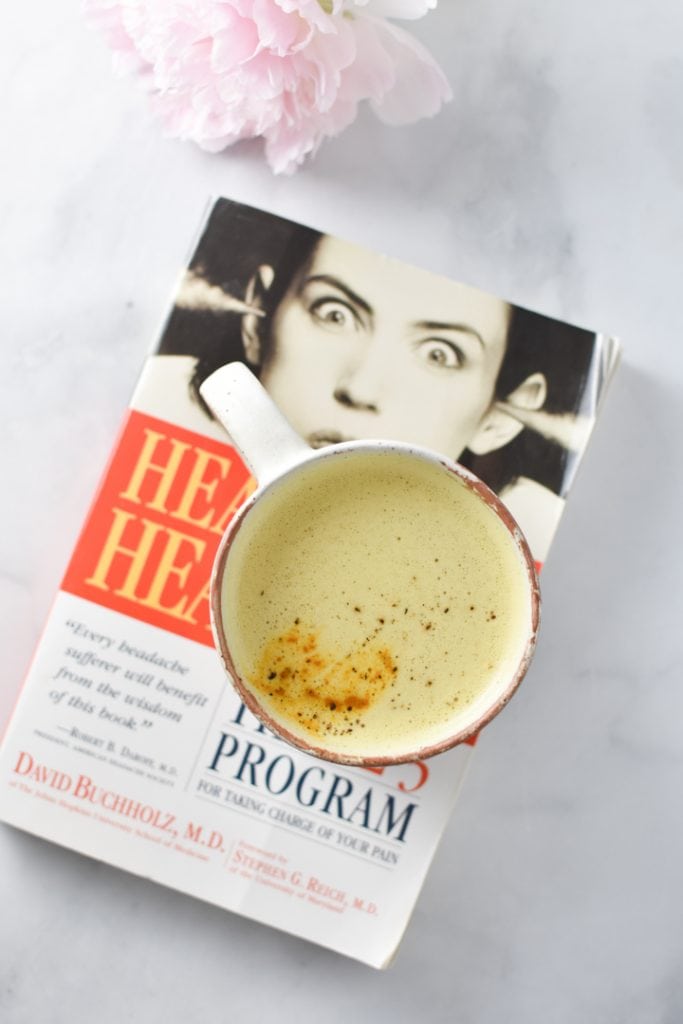
5. Books for Vestibular Migraine
Read Heal Your Headache, The Dizzy Cook, and Victory Over Vestibular Migraine
Even if you don’t get headaches (like I didn’t), this is still worth a read. Some of it is a little outdated, like some of the information about decaf coffee and rebound days, but it’s so incredibly helpful. Dr. Buchholz touches on vestibular migraine, but that’s not why you buy this book. It can help you understand big picture thoughts on medications, the threshold theory, rebound and why Excedrin can be so bad for you.
The diet is based on his 30 years of experience with migraine patients, and although some don't agree with it, enough people find it helpful to be worth reading. Dr. Hain has some wonderful papers about vestibular disorders published on his site.
If you need extra help, The Dizzy Cook book has it all laid out for you easily! Endorsed by Dr. Buchholz, it is basically the patients perspective for implementing these changes into your life as easily as possible.

6. Implement a Migraine Friendly Diet
Whether it’s keto, a migraine elimination diet, or a Mediterranean Diet it’s one of the easiest things you can start doing for yourself. If you have a lot of other restrictions due to allergies like dairy free, gluten free or if especially if you’re a strict vegan, consider enlisting the help of a registered dietician to make sure you’re getting all the proper nutrients you need.
Food fears or being overly restrictive can easily lead to disordered eating, so try to pick one diet that works best for you and stick with it.
Don’t pile everyone else’s opinions and restrictions on yourself. I've seen a lot of crazy opinions about diet, and I try to just stay in my lane of what works best for me. Dietary changes seem to be even more effective for people with a vestibular component.
7. Consider Therapy
Many of us suffer with overwhelming anxiety. If you find yourself in this place, consider a therapist who specializes in CBT (Cognitive Behavioral Therapy).
Dr. Teixido also recommends the Feeling Good Handbook. Progressive muscle relaxation has also been very helpful for me postpartum. There are so many good, free videos on YouTube.
8. Visit VEDA
Head to the Vestibular Disorders Association website. This will provide more information on types of vestibular disorders and treatment. Here you’ll also find links to support groups, some online, and many different educational resources.
9. Find Support
A friend who is going through the same thing is invaluable. Often this can be done through private messaging someone you bond with in a support group.
When I saw Kayla’s story on VEDA I looked her up on instagram and sent her a message about us seeing the same doctor. We became instant friends since we were able to relate to everything, and eventually took our relationship to the phone. That eventually grew into meeting each other in person. And now she comes over and lets me test out recipes on her while giving me advice on marketing.
Make sure you're not confusing your support buddy for a therapist. If they're also going through something similar, they may be able to only handle so much venting and sadness before it affects their health.
Another important element is to choose the right support group. Some are more positive than others, and joining them all can immerse you in a world of negativity where you're scared to try anything new. I recommend a group like Miles for Migraine, who have both online and in person support groups, over joining anything on Facebook.
Find one you like and stick with it. Remember that the majority of people in facebook groups are still ill and haven't found their perfect combo yet (or they have given up). The ones who get better leave to go live their lives to the fullest.
So while it seems like some people feel awful forever, that's not the case for everyone. Me and many of my vestibular migraine friends are proof of that.
10. Give It Time
This is unfortunately not something that will change overnight. It takes a lot of work and consistency. I personally didn’t have any improvement for months. It took me over 2 full years to get to 100% days. Too often I see people stop a supplement or diet one month in. Or they’ll give up on a medication just a week in.
These things work together to help you, and some of the side effects can lessen over time. It is typically not a "take a pill and feel better the next day" kind of thing. If you’re concerned about a treatment you're on, speak with your doctor first before stopping anything they have prescribed for you. It’s important to not compare your progress to someone else.
My full vestibular migraine treatment plan.
Vestibular Migraine Posts
Shoutout to my friend and fellow VM warrior Megan Howard for her advice on this blog post! The post was updated 5.1.2020 to include new treatments and photos. It was updated again October 6, 2021 to include new doctor information.

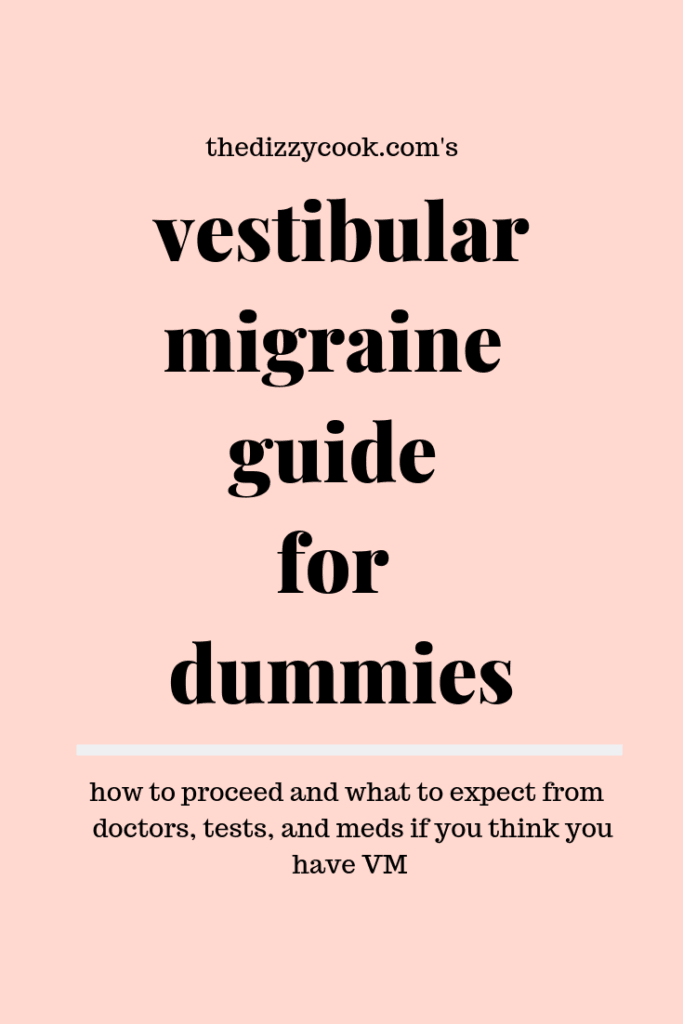
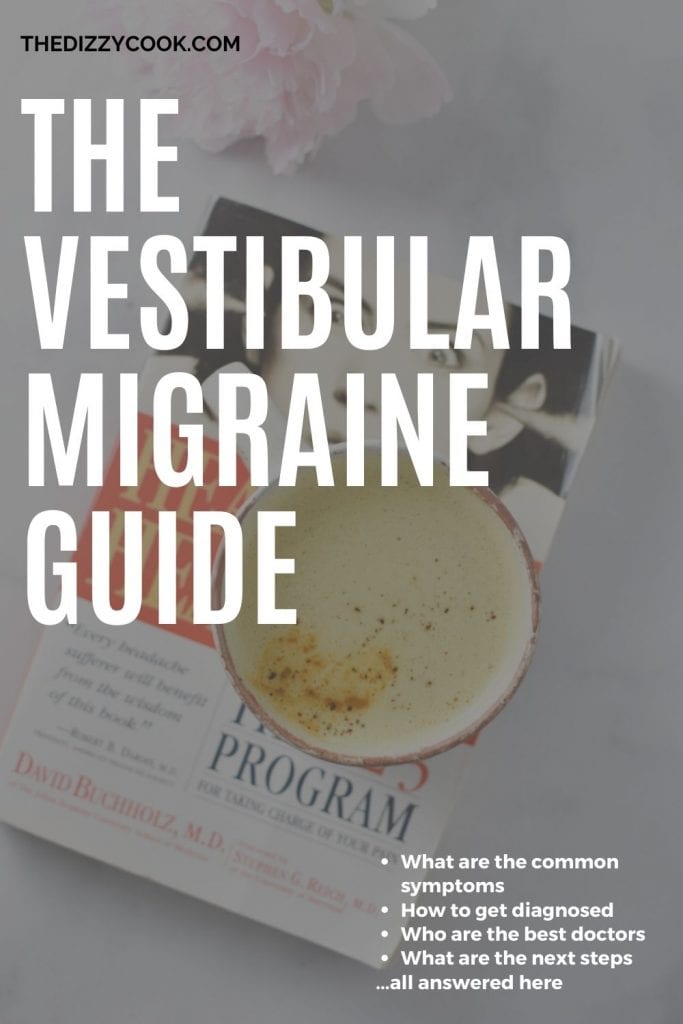
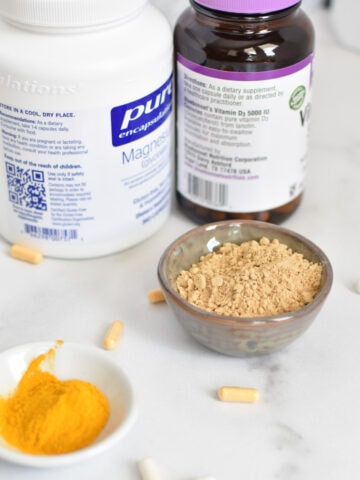
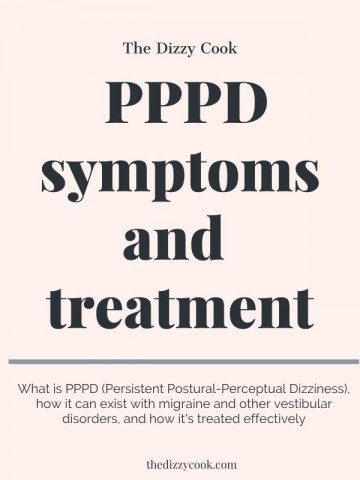
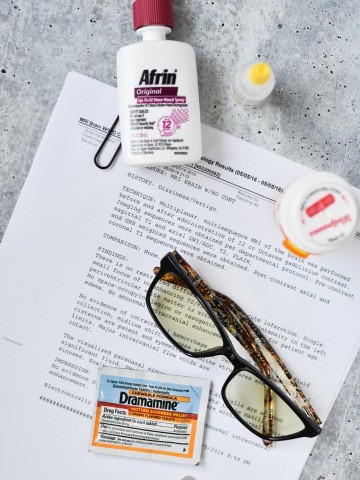
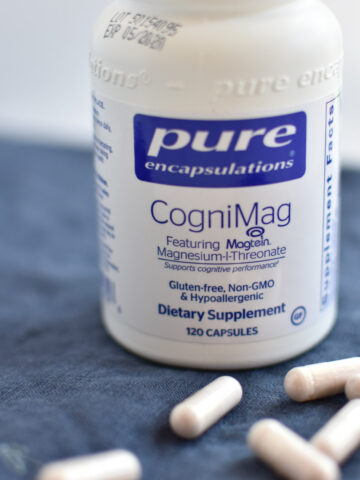

I know this a very long shot but I have suffered for 7 plus years hoping it the imbalance would go away but no it has not and probably gets alittle worse as time goes by so I was wondering if you have any known neurologists in Canada or Nova Scotia to be more precise that specializes in vestibular migraine area.you know my desperation after hearing your story.i can sympathize with you 100%.
I don't, but neura and Dr. Beh both see Canadian patients through telehealth and will work with your local providers.
I just started my journey, I had my first episode 6 weeks ago and it is intensifying. I have been to 7 doctors so far and just reading all of the information posted here is giving me hope.
I'm so glad! I also have a youtube page if the scrolling gets hard.
Hi,
I was diagnosed with vestibular migraine like 2 weeks ago. Just wanted to say thank you for your blog. It’s made me feel better.
I'm glad to hear that!! Happy to help.